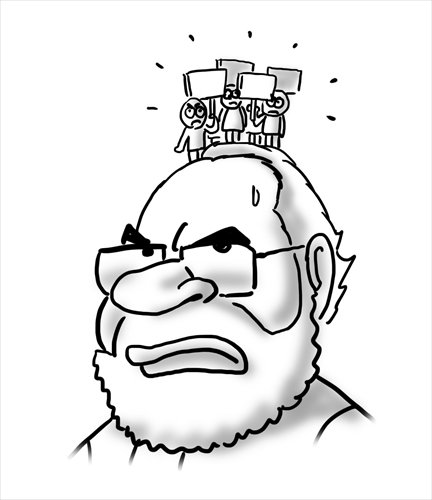Left-wing Indian student protests herald new era of culture war for Modi

Illustration: Shen Lan/GT
Student protests in New Delhi's prestigious Jawaharlal Nehru University (JNU) on February 12 have sparked huge controversy in India. Students protested against the execution three years ago of Mohammad Afzal Guru, a Kashmiri separatist, convicted of the 2001 attack on the Indian Parliament. Some students raised slogans supporting Kashmir's independence. Police soon arrested Kanhaiya Kumar, the JNU student union president, for "anti-India sentiments."
When Kumar was sent to Delhi's Patiala House court, fighting broke out both in and around the tribunal. Some blamed JNU as a "hotbed of separatism and terrorism," and resorted to personal abuse toward Kumar and his supporters. In the meantime, the media that backs Kumar and India's opposition party believe that arresting students is an abuse of justice and violation of human rights and the freedom of speech, and that Guru was framed by incompetent and corrupt police.
Guru's execution was carried out in 2013 under the leadership of the Nationalist Congress Party (NCP). But why has the Bharatiya Janata Party (BJP) taken decisive actions this time, and been burned as a result?
Kashmir was the subject of the protest, yet the focal point of argument in the public opinion is concentrated around freedom of speech. The heart of the debate is still the ideological antagonism between the left and right wings of Indian society.
Ever since Indian Prime Minister Narendra Modi took office, left-wing forces that uphold secularism have always been lashing out at the BJP and its political offshoot Rashtriya Swayamsevak Sangh (RSS) for promoting Hindutva (Hindu nationalism), hampering the freedom of expression and jeopardizing India's tentative harmony.
Last year, beef bans and attacks against social activists by right-wing forces have angered Indian intellectuals and cultural figures, who are influential on the left. Opposition parties led by the NCP swiftly took advantage of the chance, and attacked the BJP for the "intolerant" atmosphere under its rule.
Facing the accusation, the BJP has not flinched, but engaged in the debate against the left wing with great fanfare. Being pushed to the eye of the storm in the ideological confrontation was only a matter of time for the JNU, a traditional front of India's left wing.
Student movements in India have influenced the political situation many times since the nation's independence. This time, the arrest of Kumar has triggered student protest across the country. Will it shake the foundation of Modi's rule?
Currently, the answer is negative. Ever since the era of the Internet began, student movements' impact on Indian politics has been reduced. Some think that the chaotic information and value orientation in the social media have made young people more divided, and that they will find it hard to form consolidated political power. But the scale and effects of the protests remain to be seen.
Moreover, Indian society's current culture war has not yet bred large-scale violent conflicts. According to statistics given in the Lok Sabha, the lower house of India's Bicameral-Parliament, there were 650 communal incidents in the first 10 months of 2015, just six more than in 2014. In the by-elections on February 13, the BJP won four out of 12 seats, including Muzaffarnagar, the worst-hit area of communal clashes between the Hindu and Muslim communities. This reflects that the controversy, for the moment, is not strong enough to shake Modi's throne.
The author is a research fellow at the China Institutes of Contemporary International relations. opinion@globaltimes.com.cn